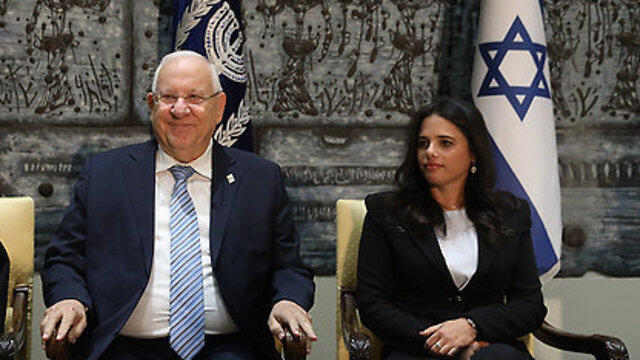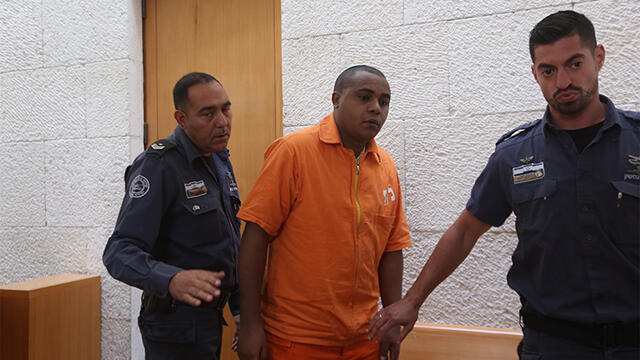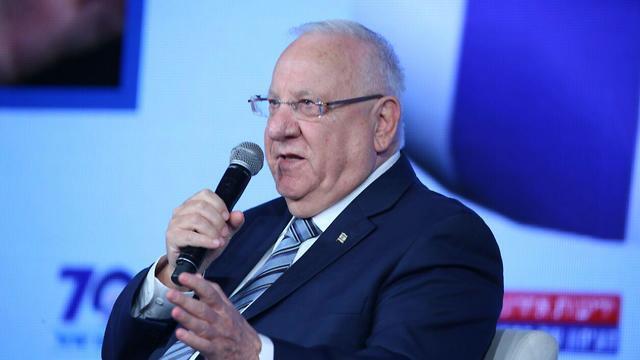Getting your Trinity Audio player ready...
President Reuven Rivlin and Justice Minister Ayelet Shaked presented Monday morning their joint plan for pardoning prison inmates in honor of Israel's 70th Independence Day, as part of which pardons will be considered for hundreds of prisoners who meet certain criteria, such as serving a third of their term.
As part of the plan, prisoners suffering from serious illnesses or from disabilities will be considered for pardon, as will prisoners over 70 and those who themselves were victims of crimes.
3 View gallery


President Rivlin (L) and Justice Minister Shaked agreed on an agreement relating to pardons for Israel's 70th Independence Day
(צילום: אוהד צויגנברג)
The president decided to lighten Heilo's sentence in November of last year, and to commute part of his sentence to probation to make him eligible to seek parole. The parole board, however, rejected Heilo's request for early release this past January, after he had served seven and a half years of his 12 year sentence
Pardons will also be mulled for prisoners who have minor children cared for by someone other than a parent due to the parent's incarceration and for prisoners serving a first stint in prison of up to two years.
Each request will be examined according to the severity and circumstances of the offense, the length of the prison term, the degree of repeat offending, danger levels, prison conduct, regret, rehabilitation and treatment processes, the stances of victims in applicable cases and more.
However, prisoners convicted of murder and manslaughter, security offenses, sex offenses and offenses relating to the jurisdiction of a military tribunal—such as Elor Azaria —willnot be able to seek pardons as part of the proposed plan, which notes pardons will be give in the form of shortening jail terms, thereby making prisoners eligible to seek early release through the parole board.
3 View gallery


Yonatan Heilo (center), who killed the man who raped him, will be ineligible for a pardon based on the new agreement
(צילום: גיל יוחנן )
Shaked: 'An opportunity to exercise mercy'
The last part of the agreement pertains to striking criminal records. The move—a collaborative effort by the President's Residence, the Justice Ministry's Pardon Department and the IDF—seeks to expunge the criminal records of soldiers who committed offenses prior to their army service, to allow them to easily return to society when they are discharged.
The plan is intended to raise awareness among soldiers with criminal records to the possibility of requesting the record be stricken and to remove bureaucratic blockages making submitting requests difficult.
A committee chaired by the IDF's chief Education and Youth officer will contact relevant soldiers personally and of its own volition and will explain to them the possibility of seeking this form of pardon, and will assist them with the submission process and gathering the requisite materials.
The pardon request will then be forwarded to President Rivlin and Minister Shaked, after being appended with a recommendation from the aforementioned committee. The same mechanism will endeavor to assist those in national service.
Commenting on the pardon plan, President Rivlin said, "A society's character is measured no less than by the way it considers its prisoners an inseparable part of its identity.
3 View gallery


President Rivlin said a society's character is also measured by how it treats its prisoners
(צילום: מוטי קמחי)
"That is precisely the relation between pardons and national milestones (such as Independence Day—ed). During these national milestones, as we do during personal ones, we stop for a moment and look beyond the daily existence to the future.
"In Israel's seventieth year, I wish to see an opportunity to extend a helping hand—a chance to stop, look and see the people we may not be able to on a daily basis—to return to our collective those who have left it and were deemed worthy of retuning."
Justice Minister Shaked weighed in as well. "Israel's 70th Independence Day celebrations are a fine opportunity to exercise a degree of mercy and to bring into the celebrations people who have made missteps in obeying the law," she said.
"The special criteria (for pardons) balance between protecting victims of offenses—hence denying pardons to those who have committed murder, manslaughter, sex crimes or security offenses—and considering the special status of those who have committed lighter offenses," Shaked continued.
"I will therefore recommend to the president to reduce the prison terms of prisoners meeting special criteria. I can only hope the State of Israel's gesture towards those prisoners will assist in their rehabilitation and return to the path of law-abiding citizens."

